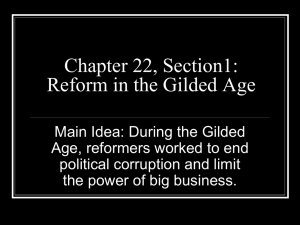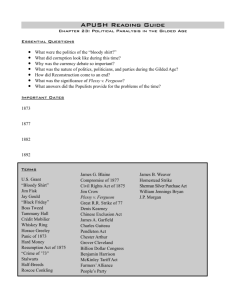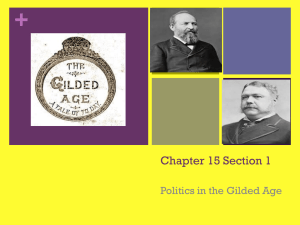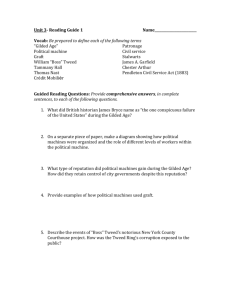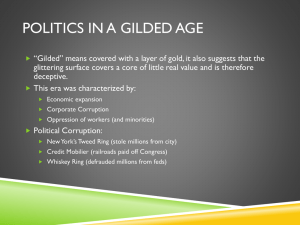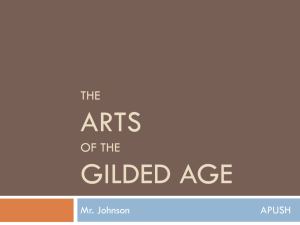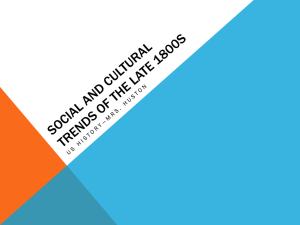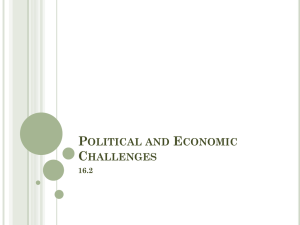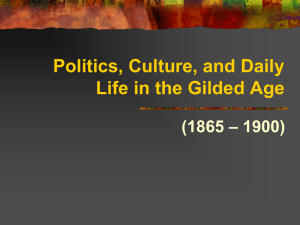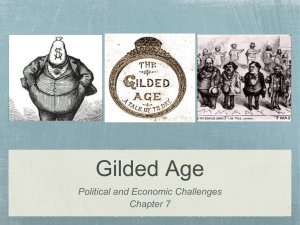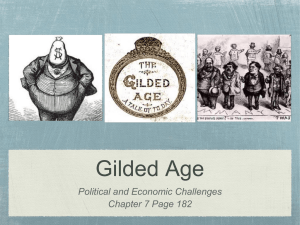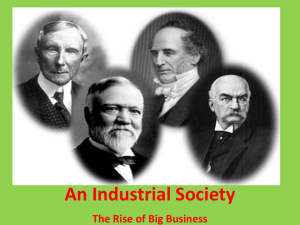File
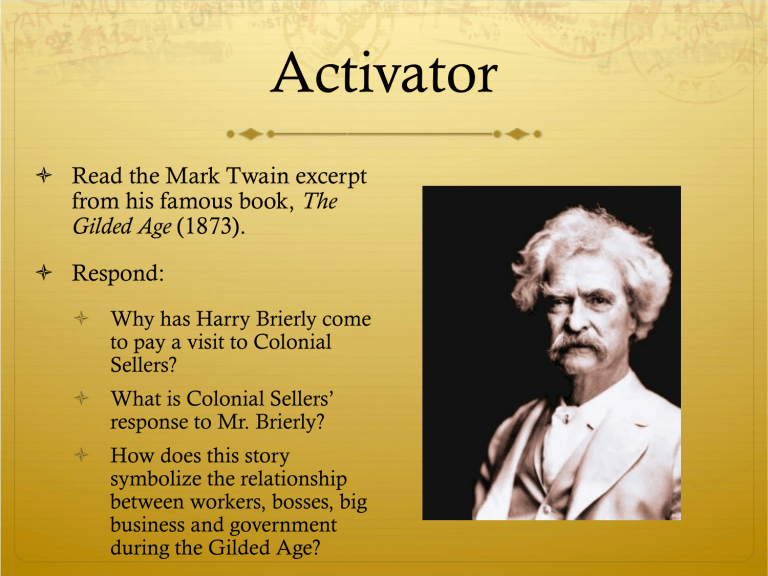
Activator
Read the Mark Twain excerpt from his famous book, The
Gilded Age (1873).
Respond:
Why has Harry Brierly come to pay a visit to Colonial
Sellers?
What is Colonial Sellers’ response to Mr. Brierly?
How does this story symbolize the relationship between workers, bosses, big business and government during the Gilded Age?
Post Civil War Economic and Social Developments,
1860 - 1890
Chapters 23 - 26
Twain’s “Gilded Age” (1873)
Gilded —appears gold on the outside but is in fact made of a cheaper metal.
Symbolizes an era of fabulous wealth, technological innovation, the growth of big business, population growth and the territorial expansion of the United
States…
…However, these “golden” achievements benefitted a small minority of Americans and concealed serious social, political and economic problems of the majority.
Road map
~10 days
Test and DBQ analysis
Independent note taking (you choose the form)
Online lectures, quizzes
Corruption, Graft and Patronage
Corruption —dishonest of fraudulent conduct by those in power, typically involving bribery
Graft —practices, especially bribery, used to secure illicit gains in politics or business; corruption
Patronage —the power to control appointments to office or the right to privileges
Jobs or favors for votes
Connection: Jackson, “spoils system”—democratic?
Civil Service Reform—meritocracy (what you know rather than who you know)
Gilded Age Party System
“Shaky equilibrium”: Majority party in the House switched six times in eleven sessions 1869-1891; only one Democratic President
Few economic issues separated parties (agreed on lowering the tariff, civil service reform, currency question)
Ferociously competitive: fierce loyalty, high turnout, voting along party lines
Sharp ethnic differences:
Republicans--Puritan (Anglo-Saxon)
Democrats—Lutheran and Catholic (German, Irish)
Geographic divisions
“Solid Democratic South” and Northern industrial cities
Republicans strong in Midwest, rural and small-town Northeast, freedmen in South, Grand Army of the Republic (GAR)
Split in Republican Party
“Stalwarts”
Led by “Boss” Roscoe Conkling, believed in patronage
“Half-breeds”
Led by James G. Blaine, wanted Civil Service
Reform
Doc Analysis
In groups of 3
Analyze Docs A – C and answer corresponding questions
“An Era of Good Stealings”
James “Jim” Fisk and Jay Gould’s “gold rush”
“Black Friday” 1869 attempt to control the gold market
Congressional probe: Grant guilty of nothing but stupidity
Credit Mobilier (1872):
Union Pacific insiders formed a construction company, hired themselves at inflated prices
Bribed Congressmen with stock; Grant’s VP accepted payments
Whiskey Ring:
Stole excise-tax revenues from Treasury department
Grant’s private secretary was involved
Boss Tweed and Tammany Hall
Stole over $200 million
Thomas Nast contributed to capture
Groups of 3
Doc D
Doc Analysis
Compromise of 1877
Settled the disputed presidential election of 1876 (Hayes-R, Tilden-D)
Tilden won popular vote, had 184/185 necessary electoral votes with 20 electoral votes disputed in four states.
Special Electoral Commission appointed—8 R vs. 7 D.
In an informal, “backroom deal” Hayes
(R) is elected by special Electoral
Commission, 8-7.
Democrats are promised:
Reconstruction Ends – 5 militarized zones abolished and military is withdrawn from LA, SC
Patronage, TCRR construction through Texas (never materializes)
Processing
Why did politics of the Gilded Age seemingly sink to such a low level? Did the Gilded Age Party System have any strengths to compensate for its weaknesses?
Freedmen
How did the Compromise of 1877 effect freedmen in the South?
What were the short- and long-term results of the
“Jim Crow” system in the South?
Why was the sharecropping system so hard to overcome?
Were blacks worse off or better off after the Civil
War?
Immigrants
How was the Chinese immigrant experience similar to that of such European groups as the Irish, and how was it different?
What effect did the racial distinctiveness of the
Chinese have on their experiences in America?
What were the great problems the Chinese-Americans experienced? How did they attempt to overcome them?
Farmers
To what extent were the Populists politically
“radical”?
Why was the political system so slow to respond to the economic grievances of farmers and workers, especially during the hard economic times of the
1890’s?
Gov & Business
During this time period, what was the government’s political philosophy with regard to the regulation and operation of business?
How did the relationship between government and business change with the passing of the Pendleton
Civil Service Act of 1833?
How did the Depression of 1893 affect the relationship between government and business?
Labor
How did the Panic of 1873 and the Depression of 1893 affect Southern and Western farmers? How did the
Panic of 1873 affect Northern factory-workers and urban laborers?
Throughout the 1880’s – 1890’s, was labor effective at winning union recognition, higher wages and better working conditions? Why or why not?
